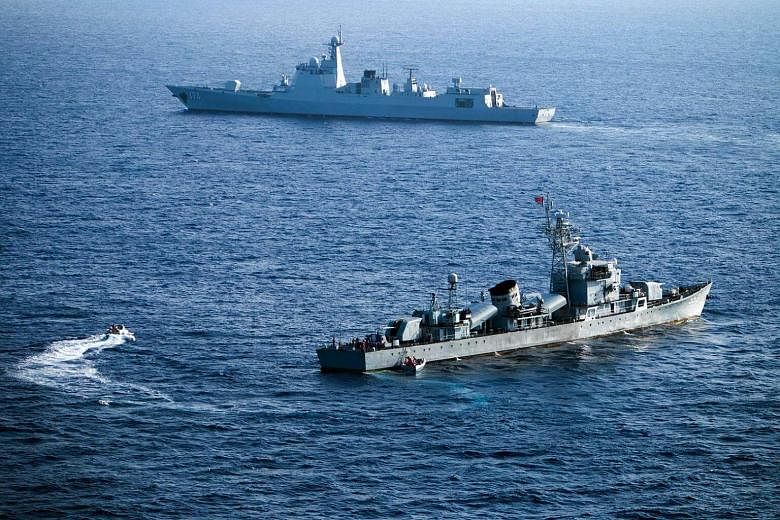China and Asean are set to launch an emergency hotline and adopt a code for unplanned encounters in the South China Sea, in steps aimed at managing risks in the vital waterway after an international ruling against Beijing's territorial claims.
Senior officials from both sides said yesterday that they have reached an agreement on a set of guiding principles for a hotline among senior diplomats and on a joint statement on the Code for Unplanned Encounters at Sea (Cues), following their meeting in Inner Mongolia's Manzhouli city.
The two documents will be submitted to leaders at the Asean-China Summit next month for their endorsement.
At the 13th Senior Officials Meeting on the implementation of the Declaration on the Conduct of Parties in the South China Sea (DOC), they also agreed to complete a draft framework for a binding Code of Conduct (COC) by the middle of next year. It marks the first time a timeline has been set officially, following calls by Chinese Foreign Minister Wang Yi at an Asean meeting last month to fast-track talks.
At a press briefing, Chinese Vice- Foreign Minister Liu Zhenmin said the DOC has not been used effectively to resolve the territorial disputes between China, the Philippines, Vietnam, Malaysia and Brunei.
"We have recognised again the need to deepen cooperation under the DOC so that we will hold the key to resolving the South China Sea disputes in our hands and prevent external interference," he told reporters.
Singapore's Ministry of Foreign Affairs Permanent Secretary Chee Wee Kiong co-chaired the two-day meeting. The Republic has been country coordinator of Asean-China dialogue relations since last year and will hold the post until 2018.
There were no details yesterday on whether the Cues would include coast guard ships. China had agreed to explore Singapore's proposal for an expanded version of the key naval protocol during Foreign Minister Vivian Balakrishnan's visit to China in March this year.
China and Asean inked the DOC in 2002, which called for disputes to be managed by peaceful means and through direct talks among claimant states. But the hopes of many were pinned on the formulation of a legally binding COC. Talks began in 2013 and have made little headway, reportedly due to China dragging its feet.
But Beijing has turned the focus on the DOC in the wake of an international arbitration ruling on July 12 against its territorial claims in the South China Sea. The Arbitral Tribunal at The Hague said there was "no legal basis" for China to claim historic rights to resources in the South China Sea under the "nine-dash line". It also ruled that none of the Spratlys is an island under the United Nations Convention on the Law of the Sea and is not entitled to a 200 nautical mile exclusive economic zone of its own.
China refused to take part in the case initiated by the Philippines and does not abide by the ruling, which it denounced as "null and void".
Nanjing University's South China Sea expert Zhu Feng said the outcome of the meeting reflects a mutual sense of urgency to lower risks and manage the disputes.
"Particularly on China's part, there is a need to be seen as being more proactive to resolve the disputes through the DOC after having dismissed the tribunal ruling," he told The Straits Times.
SEE OPINION

